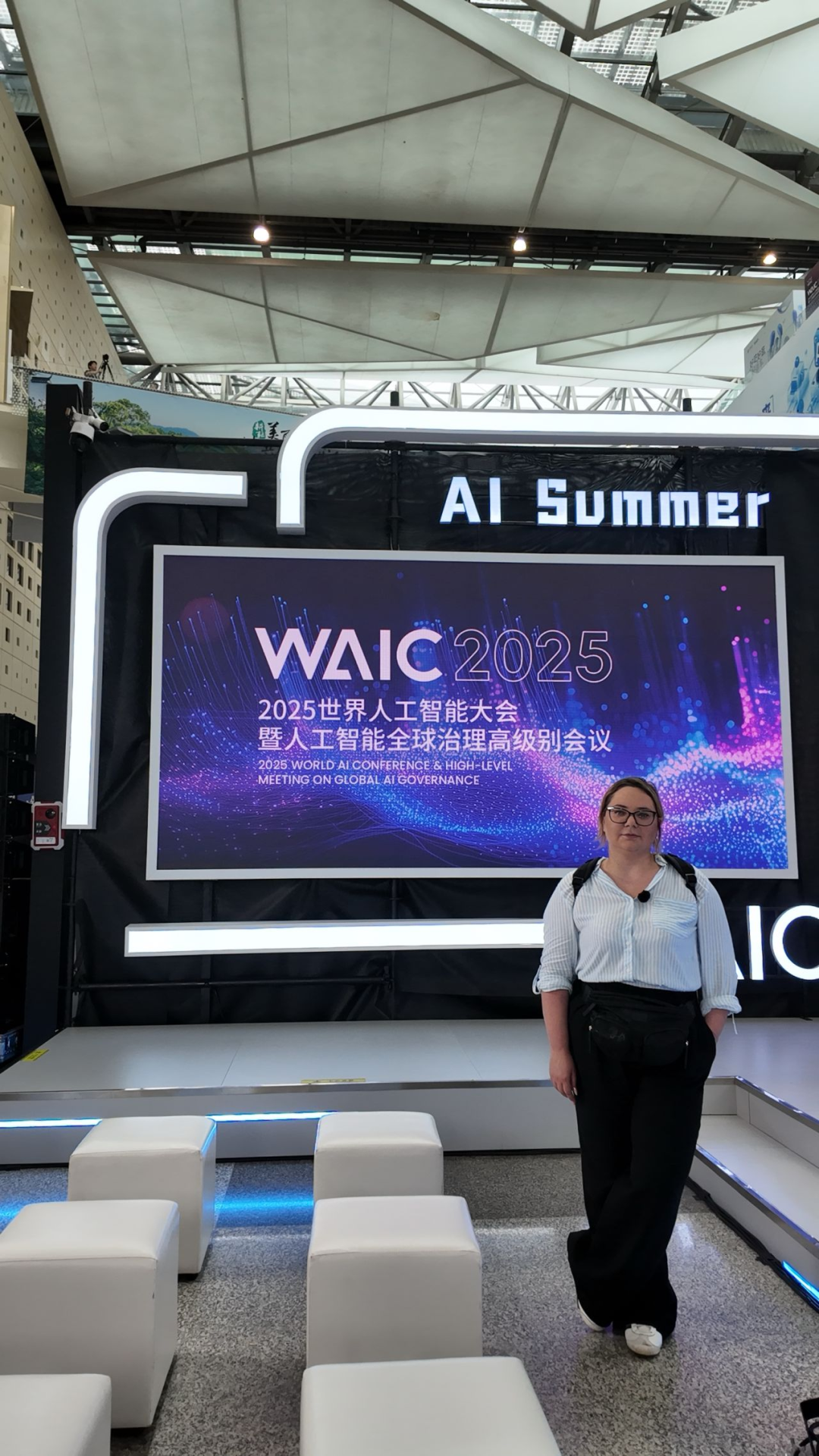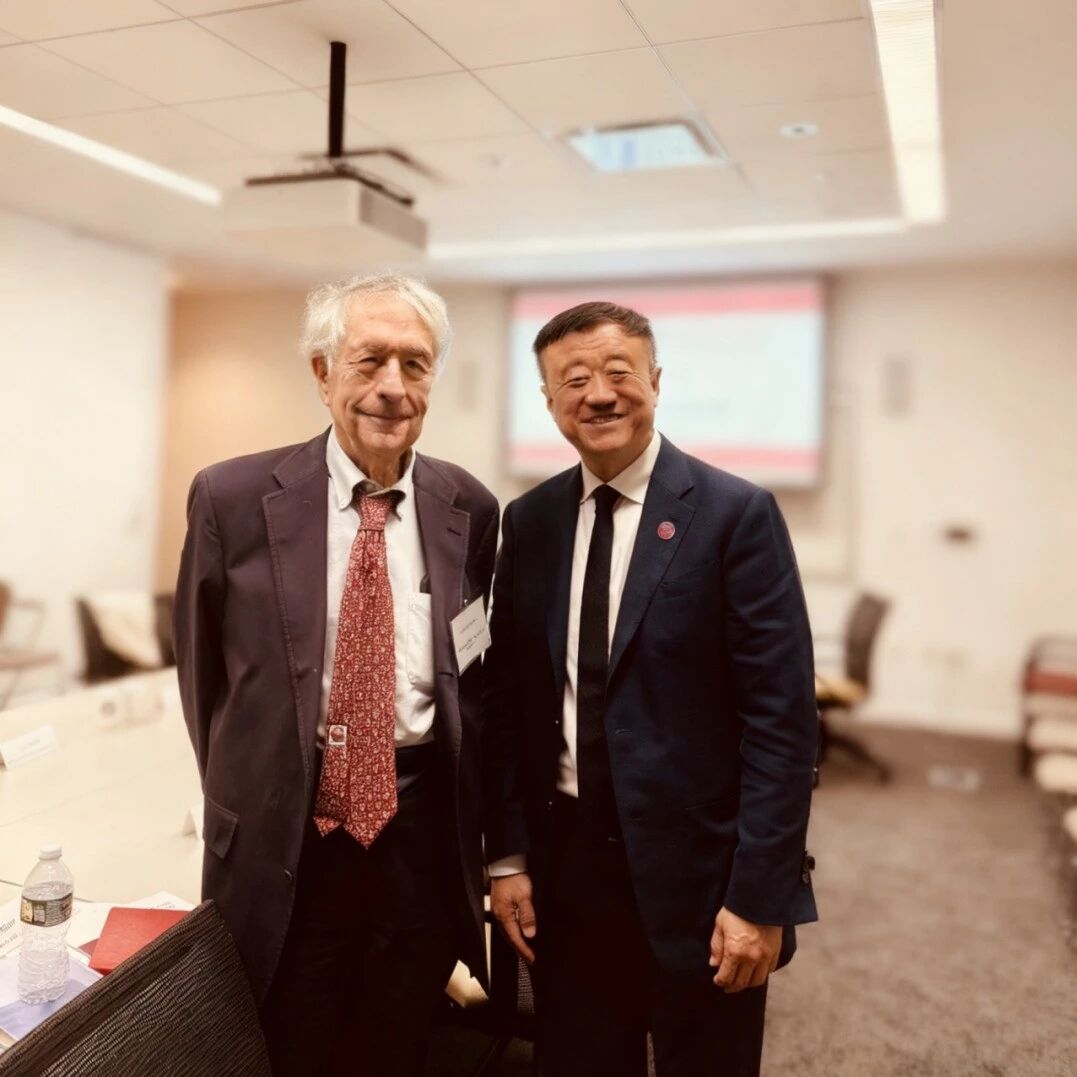
作者:Natalie Kubala
As a woman working in the B2B manufacturing sector, responsible for driving digital transformation in sales, attending WAIC 2025 in Shanghai was a very meaningful experience for me. The conference inspired me to reflect not only on the future of artificial intelligence, but also on how these innovations can truly change the daily experience of clients in industrial B2B.
作为一名在B2B制造业工作的女性,负责推动销售领域的数字化转型,参加2025世界人工智能大会对我而言意义非凡。这场盛会不仅让我深入思考人工智能的未来,更促使我反思这些创新如何切实改变工业B2B领域客户的日常体验。
In my article, I have tried to capture these impressions—from robotics and intelligent agents to digital sales applications and governance—always through the lens of what they mean for customers and the way we build business relationships.
在本文中,我试图捕捉这些思考——从机器人技术与智能代理,到数字销售应用与治理体系——始终聚焦于它们对客户的意义,以及我们构建商业关系的方式。
全文共2452字中文,预计阅读时间6分钟
(中文由大模型翻译)
Introduction
引言
The World Artificial Intelligence Conference (WAIC) 2025 in Shanghai marked a significant milestone in the global conversation on artificial intelligence. Unlike technology showcases of the past, this year’s event highlighted not just new inventions, but the integration of AI into practical business and industrial contexts.

For professionals in the B2B manufacturing sector, the conference was particularly relevant. The manufacturing industry is built on complex value chains, long sales cycles, and trust-based relationships with clients. These are precisely the areas where artificial intelligence can have the most transformative impact. From the exhibition halls to keynote speeches, WAIC 2025 revealed three major areas with direct relevance to B2B industries:
1. Robotics and embodied AI—machines enhanced by intelligence are ready to move from production lines into logistics, service, and customer-facing roles.
2. Multimodal foundation models and intelligent agents—AI systems that understand and act across text, images, and audio are redefining how companies interact with clients.
3. Business-ready AI applications, including digital sales agents, supported by infrastructure and governance frameworks—showing how AI can be scaled safely, efficiently, and with trust.
1、机器人与具身智能——智能赋能的机器已准备好从生产线走向物流、服务和面向客户的角色。
Each of these themes offers clear implications for B2B clients: more speed, better personalization, stronger reliability, and higher transparency in how they interact with suppliers.
Robotics and Embodied AI—From Showcase to Practical Impact
机器人与具身智能——从展示走向实际影响
Robotics captured much of the public imagination at WAIC 2025. Humanoid robots from Unitree, agile and dynamic, sparred in boxing demonstrations. Robots from Fourier Intelligence highlighted therapeutic and human-interaction capabilities. Service robots wrote calligraphy, tidied spaces, and guided visitors. Together, they showcased how embodied AI—artificial intelligence embedded into physical bodies—is no longer a futuristic experiment but an emerging reality.
机器人技术在WAIC 2025上吸引了大量关注。宇树的人形机器人灵活地进行拳击演示,傅利叶智能的机器人展示了治疗与人机交互能力,服务机器人则现场书写书法、整理空间、引导参观者。这些展示了“具身智能”(即嵌入物理实体中的人工智能)已不再是未来的实验,而是正在兴起的现实。
Implications for B2B Clients
In B2B manufacturing and logistics, robotics supported by AI has immediate and tangible use cases:
1. Warehouse and Logistics Automation
○AI-enabled robots can identify, pick, and transport components across warehouses.
○ Clients benefit from fewer delays, lower error rates, and better predictability in deliveries.
2. Customer Experience at Showrooms or Trade Fairs
○ Robots can demonstrate machinery, answer basic questions, or guide visitors through product displays.
○ For a client visiting a trade fair, this means faster access to information and a memorable experience that complements human interactions.
3. Safety and Risk Reduction
○Robots can take over repetitive or hazardous jobs, reducing workplace injuries.
○ For B2B buyers, this translates into safer supply partners and more resilient operations.
对B2B客户的启示
在B2B制造与物流领域,AI驱动的机器人具有即时且切实的应用场景:
1、仓储与物流自动化
AI机器人可识别、拣选并运输仓库中的零部件。 客户将受益于更少的延误、更低的错误率和更高的可预测性。
机器人可演示设备、回答基本问题或引导参观产品展示。 对于参展客户而言,这意味着更快获取信息,以及一种补充人工服务的难忘体验。
机器人可承担重复或危险的任务,减少工伤事故。 对B2B买家而言,这意味着更安全的供应链合作伙伴和更强的韧性。
Example Scenario
A manufacturing client attending a showroom in Shanghai could be greeted by a humanoid robot capable of walking them through technical product displays, answering multilingual questions, and providing instant access to digital brochures. This scenario is no longer hypothetical—it reflects the capabilities demonstrated at WAIC 2025.
示例场景
一位制造客户在上海的展厅中,可能由一位人形机器人接待,该机器人能引导其参观技术产品展示,回答多语言问题,并提供即时访问数字宣传册。这一场景不再是假设,而是WAIC 2025所展示的现实能力。
Multimodal Models and Intelligent Agents—Redefining Interaction
多模态模型与智能体——重新定义交互方式
Another central theme of WAIC was the rapid development of multimodal foundation models. Unlike earlier systems focused solely on text, these AI platforms integrate multiple forms of input—text, images, audio, even video—to deliver coherent, actionable outputs.
WAIC的另一个核心主题是多模态基础模型的快速发展。与早期仅处理文本的系统不同,这些AI平台整合了文本、图像、音频甚至视频等多种输入形式,提供连贯且可执行的输出。
Business Examples from WAIC
● MiniMax Agent: presented as a flexible system that connects to APIs, interprets various forms of input, and autonomously performs tasks.
● Step 3 Model: capable of reasoning across modalities, demonstrating how next-generation AI moves closer to general-purpose problem-solving.
WAIC上的商业案例
MiniMax智能体:一个可连接API、处理多种输入形式并自主执行任务的灵活系统。
阶跃星辰Step 3模型:具备跨模态推理能力,展示了下一代AI向通用智能的迈进。
Implications for B2B Clients
For B2B sales and industrial communication, these intelligent agents create new possibilities:
1. Offer Preparation and Technical Proposals
A client may send a technical drawing or PDF specification. Instead of weeks of manual review, an AI agent can analyze requirements, generate a preliminary offer, and highlight missing information.
2. Automated, Consistent Communication
Clients often send inquiries in unstructured ways: emails with attachments, screenshots, or voice notes. Multimodal AI can interpret all these formats and respond professionally.
3. Global Accessibility
In B2B manufacturing, international clients are the norm. Intelligent agents with multilingual capabilities allow suppliers to respond in the client’s language, increasing trust and reducing misunderstandings.
对B2B客户的启示
对于B2B销售和工业沟通,这些智能体带来了新的可能性:
1、报价准备与技术方案
客户发送技术图纸或PDF规格说明,AI智能体可在几分钟内分析需求、生成初步报价并指出缺失信息,而无需人工数周处理。
2、自动化、一致的沟通
客户常通过非结构化方式发送询问:带附件的邮件、截图或语音留言。多模态AI可理解所有这些格式并作出回应。
3、全球可访问性
在B2B制造业中,国际客户是常态。具备多语言能力的智能体可用客户语言回应,增强信任并减少误解。
Example Scenario
A European client sends a voice message describing their needs for customized machinery. The AI agent transcribes, interprets the request, cross-references product data, and delivers a first draft proposal in English, Mandarin, or any preferred language. What once required human teams across time zones can now happen in minutes.
示例场景
一位欧洲客户发送语音消息,描述其对定制设备的需求。AI智能体将其转录、理解请求、交叉参考产品数据,并在几分钟内生成英文、中文或其他语言的初步提案。过去需要跨时区人工团队完成的工作,如今可在几分钟内自动完成。
AI Infrastructure—Building the Foundation for Scale
AI基础设施——为规模化打下基础
WAIC 2025 made it clear: AI innovation depends not only on algorithms but on infrastructure. The sheer volume of computation required for multimodal models and robotics means that reliable foundations are critical.
WAIC 2025明确指出:AI创新不仅依赖算法,还依赖基础设施。多模态模型和机器人技术对计算资源的需求巨大,意味着可靠的基础设施是成功的关键。
Highlights from WAIC
● Huawei’s Ascend AI SuperNode: designed to deliver high-performance computing power for large-scale AI deployments.
● PPIO’s Agent Sandbox: providing developers with scalable environments to train, test, and deploy intelligent agents securely.
WAIC亮点
华为昇腾超节点:为大规模AI提供高性能计算能力。
PPIO的Agent沙箱:为开发者提供可扩展环境,用于训练、测试和部署智能体。
Why This Matters in B2B
1. Reliability Under Load
Industrial buyers expect AI-enabled systems to function even under heavy workloads. Infrastructure ensures that service interruptions are minimized.
2. Integration Across Systems
Manufacturing sales processes span ERP, CRM, and logistics systems. Infrastructure allows AI to pull data from all these sources for seamless operations.
3. Security and Compliance
Sensitive business data is central to B2B. Strong infrastructure ensures encryption, compliance with regulations, and protection of proprietary information.
为何对B2B至关重要
1、高负载下的可靠性
工业客户期望AI系统在重负载下仍能正常运行。基础设施可最大限度减少服务中断。
2、系统间的集成
制造业销售流程涉及ERP、CRM和物流系统。基础设施使 AI 能从所有这些系统中提取数据,实现无缝操作。
3、安全与合规
B2B涉及敏感商业数据。强大的基础设施可确保加密、合规并保护专有信息。
Example Scenario
A client requests real-time delivery updates. An AI agent retrieves live logistics data, integrates it with ERP production schedules, and generates an accurate delivery forecast. This is only possible when robust infrastructure connects all systems behind the scenes.
示例场景
客户请求实时交货更新。AI智能体获取实时物流数据,与ERP生产计划集成,生成准确的交货预测。这只有在强大的基础设施连接所有系统时才可能实现。
Digital Sales Agents—AI at Work in Business
数字销售代理——AI 在商业中的实际应用
While robotics and infrastructure may seem futuristic, WAIC also presented highly practical business applications of AI today. One notable example came from Yiren Digital, which showcased its AI sales agent. This agent executes more than 1,700 personalized marketing strategies daily, engaging customers at scale. It automates outreach, tailors communication, and ensures timely follow-up.
尽管机器人和基础设施可能显得未来感十足,WAIC也展示了AI在当前极具实用价值的商业应用。例如,宜人智科展示了其AI销售代理,该代理每天执行超过1,700条个性化营销策略,实现大规模客户互动,自动开展外联、定制沟通并确保及时跟进。
Applications in Industrial B2B
1. Lead Qualification
Digital sales agents can filter incoming inquiries, ensuring that sales teams focus their attention on high-value prospects.
2. Scalable Engagement
Clients often require ongoing communication during long sales cycles. AI agents ensure no inquiry goes unanswered, regardless of volume.
3. After-Sales Service
Agents can provide reminders for maintenance, share training materials, and respond to service tickets, improving client satisfaction and retention.
在工业B2B中的应用
1、潜在客户筛选
数字销售代理可筛选来电咨询,确保销售团队专注于高价值潜在客户。
2、可扩展的互动
在长销售周期中,客户常需持续沟通。AI代理确保无论询问量多大,都不会遗漏。
3、售后服务
代理可提醒维护、分享培训材料、回应服务请求,提高客户满意度。
Example Scenario
A manufacturing client sends an inquiry through an online portal. Within seconds, the AI sales agent responds with tailored information, schedules a call with a human sales manager, and later follows up with relevant technical documentation. For the client, the experience is seamless, timely, and consistent.
示例场景
制造客户通过在线门户发送询问,AI销售代理在几秒内回应定制信息,安排人工销售经理通话,并随后跟进相关技术文档。客户体验无缝、及时且专业。
Governance and Responsible AI—Building Trust
AI治理与负责任AI——建立信任
Beyond the technology, WAIC emphasized governance, safety, and responsible AI. Discussions included frameworks for managing risks, ensuring transparency, and creating standards for global adoption.
除了技术本身,WAIC还强调了治理、安全与负责任AI的重要性。讨论涵盖了风险管理框架、透明度保障以及全球标准的制定。
Why Clients Care
In B2B relationships, trust is everything. Clients evaluating AI solutions ask:
● Is my data secure?
● Are decisions transparent and explainable?
● Will AI simplify collaboration or create new risks?
客户为何关注
在B2B关系中,信任至关重要。客户评估AI解决方案时会问:
我的数据安全吗?
AI的决策是否透明、可解释?
AI会简化协作,还是会带来新风险?
Responsible AI frameworks directly address these concerns. For industrial buyers, confidence in data handling and system reliability often determines whether they adopt a new solution.
负责任的AI框架直接回应了这些关切。对工业买家而言,对数据处理和系统可靠性的信心,往往决定了他们是否采用新技术。
Conclusion and Reflections
结论与反思
WAIC 2025 made one message clear: artificial intelligence is not an optional add-on. It is becoming central to how B2B industries operate and how clients expect to be served. From robotics to intelligent agents, from infrastructure to digital sales applications, AI is reshaping the client experience in four critical ways:
● Faster responses and higher-quality service through AI-enabled communication,
● Tailored interactions across the sales cycle, from proposal to after-sales,
● Greater transparency and predictability, strengthening trust,
● Stable, secure systems that integrate seamlessly into daily operations.
WAIC 2025传达了一个明确的信息:人工智能不再是可选项,它正成为B2B行业运营的核心,以及客户期望被服务的方式。从机器人到智能体,从基础设施到数字销售应用,AI正在以下四个方面重塑客户体验:
更快响应与更高质量服务(通过AI驱动的沟通)
销售全流程的个性化互动(从提案到售后)
更高的透明度与可预测性,增强信任
稳定、安全的系统,无缝融入日常运营
For industrial clients, the key insight is this: AI is setting a new baseline for what “good service” means in B2B. From the first inquiry to long-term support, artificial intelligence is now part of the client’s expectation. Companies that embrace this shift will not just improve efficiency; they will redefine the very standards of B2B relationships in the years ahead.
对于工业客户而言,关键洞察是:AI正在设定B2B“优质服务”的新基准。从首次询问到长期支持,人工智能已成为客户期望的一部分。拥抱这一变革的企业,不仅将提升效率,更将在未来重新定义B2B关系的标准。













